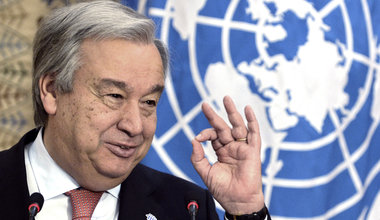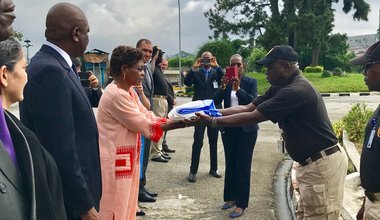REVUE DE PRESSE INTERNATIONALE DU MERCREDI 7 NOVEMBRE 2012
Côte d'Ivoire: découverte de fosses communes
Connectionivoirienne.net (07/11/2012) - De nouvelles fosses communes ont été découvertes en Côte d'Ivoire, près de l'endroit où des réfugiés ont été attaqués en juillet dernier lors de violences post-électorales, ont annoncé mardi les autorités ivoiriennes. Selon les associations de défense des droits de l'Homme, l'armée ivoirienne s'est livrée à des exécutions sommaires. Le mois dernier, six corps avaient été découverts par les autorités dans un puits près de Duekoue, une ville de l'ouest du pays.
Le maire adjoint de Duekoue, Paul Mondouho a déclaré que le gouvernement, l'armée et les représentants des Nations unies avaient inspecté samedi une dizaine d'autres fosses communes dans la même zone. Selon les autorités, le nombre de victimes n'est pas connu, les fouilles n'étant pas terminées. Le ministère de la justice a assuré en octobre dernier qu'une enquête serait menée pour connaître l'origine de ces fosses. Le procureur Noel Dje Enrike Yahau a confirmé la découverte des fosses sans pouvoir fournir plus de détails.
Une porte-parole de l'ONU, Sylvie van den Wildenberg, a elle indiqué que les forces onusiennes ont aidé à ériger un périmètre de sécurité englobant dix puits ressemblant à celui dans lequel les six corps ont été découverts. Des centaines de personnes avaient attaqué et incendié le camp de Nahibly le 20 juillet dernier, en Côte d'Ivoire. Ce camp abritait 4.500 personnes fuyant les violences. Le camp hébergeait majoritairement des personnes de l'ethnie Guere, soutiens de l'ancien président Laurent Gbagbo. La veille, le 19 juillet dernier, quatre hommes et une femme, tous de l'ethnie Malinke, avaient été exécutés. Cette ethnie a largement soutenu le président Alassane Ouattara, lors de la très disputée élection présidentielle de novembre 2010. [...]
New mass graves found in Ivory Coast
Un.newsedge-web.com / Associated Press (November 06, 2012) - Up to 10 new mass graves have been discovered near the site of a July attack on a camp for displaced people, officials said Tuesday, amid allegations that initial casualty totals were downplayed to mask killings carried out by the national army.
Rights groups claim summary executions were carried out by the Republican Forces of Ivory Coast, known by its French acronym of FRCI. Last month, officials found six bodies in a well close to the former campsite in the western town of Duekoue. Government, army and U.N. officials toured 10 more graves in the same area on Saturday, said Paul Mondouho, vice-mayor of Duekoue. He said the graves had first been identified by civilians, and that officials did not know the number of bodies they contained because they had not yet been properly exhumed.
"People were suspecting the presence of bodies in these graves because of the smell coming out of them and because of the shoes we saw nearby," Mondouho said. Prosecutor Noel Dje Enrike Yahau, who is based in the commercial capital of Abidjan, confirmed that multiple new graves had been discovered but could not provide details. U.N. officials and the local prosecutor in charge of investigating the suspected killings could not be reached Tuesday.
Army spokesmen could not be reached Tuesday. The Justice Ministry has previously vowed to investigate the discovery of the initial grave. On the morning of July 20, a mob descended on the U.N.-guarded Nahibly camp, which housed 4,500 people displaced by violence in Ivory Coast, burning most of the camp to the ground. Officials said at the time that six people were killed.
The attack was prompted by the shooting deaths of four men and one woman on the night of July 19, according to local officials and residents. In response a mob of some 300 people overran the camp on the morning of July 20 after the perpetrators of the shootings reportedly fled there. The victims in the July 19 attack lived in a district dominated by the Malinke ethnic group, which largely supported President Alassane Ouattara in the disputed November 2010 election. The camp primarily housed members of the Guere ethnic group, which largely supported former President Laurent Gbagbo.
Gbagbo's refusal to cede office despite losing the election to Ouattara sparked months of violence that claimed at least 3,000 lives. Albert Koenders, the top U.N. envoy to Ivory Coast, said one week after the attack that U.N. security forces had been inside and outside the camp at the time but that no Ivorian security forces were present. He said the U.N. forces decided not to fire at a large group of people that were attacking the camp in order to avoid "a massacre."
Several witnesses have said soldiers and traditional hunters, known as dozos, participated in the attack on the camp. Both military and dozo leaders have denied the claims, saying they had tried to protect the camp. In a statement released Friday, the International Federation for Human Rights, known by its French acronym of FIDH, said it had information _ including the preliminary results of autopsies _ confirming that the six bodies found in October were men who had been summarily executed by the army.
"The disappearance of dozens of displaced persons after the attack, as well as confirmation of cases of summary and extra-judicial executions, suggest a much higher victim rate than the official figures report," said the organization, which counts Ivorian civil society groups among its members.
Duekoue was one of the hardest-hit towns during the post-election violence. The U.N. has established that at least 505 people were killed in and around the town, including during a notorious March 2011 massacre that claimed hundreds of lives and was allegedly carried out by fighters loyal to Ouattara.
Duekoue residents belonging to ethnic groups that supported Gbagbo have long complained about abuses carried out by the FRCI, with some pointing to the direct involvement of the local commander, Kone Daouda. FIDH said in its statement that Daouda had been transferred following the discovery of the grave in October, and called for him to be interrogated over the matter. The group also said two FRCI members were being "actively sought" after failing to return to their barracks on Oct. 16, noting that they are believed to have fled to neighboring Burkina Faso. [...]
Côte d'Ivoire: Le commissaire du gouvernement relance la traque des FRCI « racketteurs »
Koaci.com (06/11/2012) - Retour en force du racket en Côte d'Ivoire, les autorités réagissent. A l'occasion d'une séance de travail avec une délégation de l'Unité de lutte contre le racket (ULCR), le commissaire du gouvernement a ce mardi invité les populations à dénoncer tous les actes de rackets perpétrés par les forces de l'ordre ivoiriennes. « Dénoncez le racket. Les victimes doivent dénoncer le racket. Les populations doivent nous apporter les preuves. La dénonciation n'est pas la calomnie,» a déclaré Ange Bernard Kessi Kouamé.
Conscient de l'ampleur que prend ce fléau, le commissaire du gouvernement précise que les populations ont le choix entre l'Unité de lutte contre le racket (ULCR) et le parquet militaire pour faire aboutir leurs différentes plaintes. En déplorant par ailleurs ces pratiques chères à certains éléments des Forces républicaines de Côte d'Ivoire (FRCI), notamment les gendarmes, les policiers, les douaniers et les Eaux et forêts, Ange Bernard Kessi Kouamé rappelle qu'elles ont pris de l'ampleur depuis que le gouvernement ivoirien a pris la décision de renforcer le dispositif sécuritaire suite aux attaques répétées des positions des FRCI. « Au lieu de se préoccuper aux fouilles des véhicules, les agents des forces de l'ordre s'adonnent au racket, » a dénoncé le procureur du parquet militaire.
Ange Bernard Kessi entend s'investir dans la relance des activités de l'ULCR encore improductives depuis sa date de création. «Le rôle d'un agent lors des contrôles est de rechercher des armes dans les véhicules et non demander les pièces des occupants,» a averti le commissaire du gouvernement annonçant au passage que les agents de l'ULCR effectueront des contrôles inopinés à travers le pays. « L'Unité de lutte contre le racket investira le terrain pour extirper du lot les forces de l'ordre qui s'adonnent au racket, » a-t-il martelé.
Avouant que leurs collègues s'adonnent au racket, l'un des responsables de la police judiciaire à l'ULCR, le lieutenant Pierre Oulote estime qu'un travail est abattu par ses hommes dans l'ombre pour mettre fin au phénomène de racket et que plusieurs moyens seront par ailleurs utilisés pour la traque des FRCI véreux sur le terrain. Avec le départ de Tuo Fozié précédemment patron de l'ULCR, l'intérim est assuré par le commissaire de police, Alain Oura Kouamé. [...]
Ivorian reggae singers bury rivalry for "peace" tour
Un.newsedge-web.com / Reuters (November 06, 2012) - As darkness falls over Ivory Coast's lagoon-side commercial capital a steady thumping cuts through the tropical night. But where once the thud of heavy weapons set Abidjan's residents scrambling indoors for cover, tonight it is a reggae bass line that draws them out.Here, little over a year ago, supporters of then-president Laurent Gbagbo and his rival Alassane Ouattara were fighting a brief post-election civil war, the final deadly showdown of a decade-long political crisis. After years teetering precariously between war and peace, the flames of division, xenophopia and anger - fanned in no small degree by some of the country's most famous musicians - exploded into a conflict in which more than 3,000 people died. One of Ivory Coast's leading reggae artists, Serge Kassy, even rose to become a leader and organiser of Gbagbo's Young Patriots street militia - a group accused of numerous atrocities during the war. Kassy is now in exile.
``When I looked at the musical scene in Ivory Coast, I realised that we ourselves went too far,'' said Asalfo Traore of the zouglou band Magic System, one of the few groups that refused to take sides during the crisis years. ``It was when everything was ruined that we wanted to glue the pieces back together. But it was too late.'' Now, long-divided musicians are once again coming together, hoping to use their influence, so destructive for so long, to help Ivory Coast heal its deep wounds, and the country's leading rival reggae artists are showing the way.
REGGAE RIVALRY
The long feud between Alpha Blondy and Tiken Jah Fakoly is a thing of legend in the reggae world, though neither has been willing to say what was behind the bad blood. Both men come from Ivory Coast's arid north and share a musical genre. But the similarities stop there.
Alpha, considered the father of Ivorian reggae, takes the stage in Abidjan clad in a shimmering pink suit, golden tie and Panama hat of an urban dandy. Tiken wears the traditional flowing robes of his northern Malinke tribe.
During the crisis, Alpha remained in Ivory Coast, while Tiken, a vocal critic of President Gbagbo's regime, went into exile in neighbouring Mali. They had so successfully avoided each other during their long parallel careers that before he picked up the phone to approach Alpha with the idea of uniting for a series of peace concerts, Tiken claimed they'd met only twice. ``Before going to the Ivorians to ask them to move towards reconciliation, it was important for us to show a major sign. That's what we did,'' Tiken told Reuters.
Out of a meeting in Paris was born a simple idea: six concerts in six towns across a country once split between a rebel north and government-held south, bringing together musicians from across the political spectrum to push for peace. ``No one's died over the problems between Tiken and me,'' said Alpha. ``There are things that are more serious than our little spats, our pride and our vanities.'' Uniting the Ivorian music scene proved relatively easy in the end. Uniting the country could prove a tougher task. [...]
West African army chiefs meet on Mali intervention
Un.newsedge-web.com / AFP (November 06, 2012) - West African army chiefs met Tuesday to study a proposal drafted by international experts on how their troops could expel Islamic extremists who have occupied northern Mali for months. The meeting comes seven months after radicals linked to the north African Al-Qaeda branch took over the vast arid north, triggering fears in the region and among Western powers that the zone could become a new haven for terrorists.
Diplomatic efforts for a military solution have intensified, but negotiations are also under way to get the main Islamist group Ansar Dine to cut ties with Al-Qaeda in the Islamic Maghreb, with talks in Algiers and Ouagadougou. Military bosses from the Economic Community of West African States (ECOWAS) need to approve the details for an eventual military operation which were drawn up during a week-long meeting of international experts in Bamako.
"It is about coming to a rapid agreement on an operational concept to help Mali quickly reconquer its north," said Ivory Coast's army chief General Soumaila Bakayoko. The plan will then be passed to regional heads of state for approval before being presented to the UN Security Council on November 26.
The United Nations wants clarification on the makeup of a regional force, the level of participation from various west African states, and the financing and military means available.
Guinea's former transition leader General Sekouba Konate, who was charged by the African Union with leading the standby force, praised the development of the military strategy. "The crises which Mali is facing are detrimental to peace in the sub-region," Konate said. "Mali can count on its friends, its partners from the standby force, to respect its territorial integrity."
Mali, once one of the region's most stable democracies, rapidly imploded after a Tuareg rebellion for independence began in January and overwhelmed the state's poorly equipped army. Angry over the government's handling of the crisis, soldiers staged a coup in March, which only made it easier for the rebels to seize a string of desert towns. The secular separatists were quickly sidelined by Islamists fighting on their flanks who had little interest in their aspirations for an independent homeland and set about implementing strict sharia law.
Ansar Dine ("Defenders of Faith" in Arabic) and AQIM splinter group the Movement for Oneness and Jihad in West Africa (MUJAO) have stoned people to death, whipped them, amputated limbs and forced women to cover up. However in talks in Ougadougou, Ansar Dine delegates insist their group -- made up mainly of Malian Tuareg like its chief, Iyad Ag Ghaly -- has not committed "any act of terrorism" and favours a negotiated settlement to the crisis.
"We have nothing to do with terrorism. We condemn terrorism, we condemn those who kidnap hostages," a source close to the Ansar Dine delegation told AFP. "We want direct discussion with our brothers in Bamako," he said. Their team in Burkina Faso will on Tuesday meet the country's President Blaise Compaore, who is the lead ECOWAS mediator.
The 16-nation west African bloc has demanded that Ansar Dine end "terror and organised crime" in the region, abandon its allies and engage in a dialogue to re-establish a unified Mali.
This will involve further negotiations with Bamako -- where a fragile interim government has struggled to assert itself -- as well as the Tuareg rebel group the National Movement for the Liberation of Azawad (MNLA). Another Ansar Dine delegation is in Algeria for talks. [...]
 ONU
ONU Nations Unies Maintien de la paix
Nations Unies Maintien de la paix



